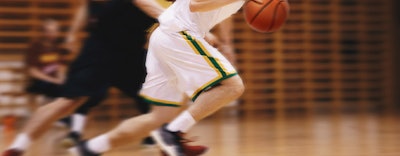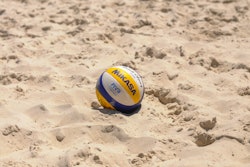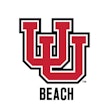
Now that college student-athletes can make money off of their name, image and likeness, better known as NIL (see Legal Action for more on NIL), questions remain about how the drastic changes in collegiate athletics might trickle down to the prep level.
National Federation of State High School Associations executive director Dr. Karissa L. Niehoff put out a strong statement in July when the NCAA Board of Governors approved the policy giving student-athletes in all divisions the ability to profit from sponsorship opportunities for the first time. Niehoff made it clear that high school athletes are staying amateurs and can't earn NIL money.
In mid-July, Niehoff spoke to reporters via a video news conference to further answer NIL questions specific to the high school ecosystem. Below is a condensed transcript of the Q&A, edited by Athletic Business for style and space:
If a high school student who excels in music or theater is free to make money on the side through NIL opportunities and participate in the school band or school musical, what's the argument against athletes doing the same?
So, right now, about half of our state associations also have some form of regulatory oversight over speech, debate, music, theater, performing in fine arts areas. Half of our state associations are strictly athletic.
So, within their bylaws and regulations, there are requirements that student-athletes, under any of the activities that they oversee, participate as amateurs. If a particular association has band under their auspices and school bands go and compete, there could be language that says this musician cannot receive financial benefit or remuneration, perhaps, beyond travel expenses.
We know that young people have followings, they have TikTok exposure, they have social media platforms, they're entrepreneurs. But what we do not want to see is that they are professionals or benefitting financially while they're wearing the uniform of the school, so there's a difference there.
I do not personally know of individual musicians that earn money while wearing the high school uniform. That's what we are discouraging. If they go out and give music lessons, and that's who they are and they're earning money as a high school person teaching music, fantastic. But the money that they're receiving is likely not because they are teaching music while wearing the band uniform. And that's where we really want to carve out a pretty strong line.
If a high school student makes money on their name, image and likeness with a club sport, or if a state approves it for high school athletics at some point, would there be any initial eligibility issues for the student with NCAA amateurism requirement?
Well, there could be a mess. Absolutely, there could be a lot of issues. What we are concerned about is if state legislatures start to pass laws that now speak specifically to high school student-athletes. And our concern is that the decisions would be made by legislators as opposed to educators — the people who actually do the work in high schools and do the work of high school athletics. Legislators aren't the people who do that, and we believe should not be making those decisions without being thoroughly informed about the business of high school sports. We are not college. And we are not the NCAA. We are school, and we offer activities designed to teach, designed to engage — for a lot of kids perhaps for the first time. We're designed to coach and offer experiences that are the second half of the whole school day. We are not about elitism. Our concern would be that if a state legislature says, "Okay, high schools, you can earn money now." As a high school student-athlete, wearing the jersey of your school, there would be major conflicts right now. What are current state association bylaws that don't allow it anywhere? State law would create huge conflicts.
When it comes to NCAA prospective student-athlete eligibility — and this is where there's probably the confusion about where high school kids can engage in NIL conversations — high schoolers are prospective collegiate student-athletes. Right now we have recruiting laws that the NCAA has in place. They do not want NIL conversations to be an incentive in the recruiting process.
If the student-athlete is that good that they can play in college, the recruiting experience really needs to be about further development based on that young person's prowess, their personality, what kind of coaching style clicks, what the team environment is and the place that they're going. Is it D-I, II or III? As a former D-I athlete, I will tell you, it is vastly different than high school. So if we help our kids go from high school to college — and we want to do the best we can — it has nothing to do with money. Nothing. And if NIL becomes an influencer in that decision before the recruitment process that is healthy, we are extremely concerned.
Say an athlete signed an NIL deal through an AAU basketball team and then tried to play in that same sport or another sport, is there a way to block that? Essentially, would a high school athlete be allowed to pursue NIL opportunities as long as they're not wearing school-affiliated gear?
Yeah, so, obviously, if they engage in that through an AAU program — the example in the question — they can go ahead and do that. The problem would be if they also wanted to play for their high school team. So now they would be a young person who is bringing a professional relationship to the high school program. There would need to be a very clear separation. The high school young person cannot in any way, shape or form bring a professional identity to the high school environment. I can't speak for specific state association bylaws, as they can look slightly different. But this would be a professional young person who — and I would assume if they're playing in an AAU program, it's year-round — if they're getting paid to do it, they're likely not going to be able to also play for their high school team at the same time that they are functioning as a professional athlete.
What are some tips for administrators and schools to deal with the recruitment of high-profile athletes in their schools as it relates to NIL?
I think the first question would be: Who's talking to our kids?
So if you are an administrator and you learn that one of your students is caught up in an NIL relationship, well, with whom? And are they talking about this with a college coach? And are they following appropriate recruitment protocols into college? If so, talk to your high school coach, talk to the young person and their family, find out with whom they're engaged and what kind of NIL conversation is being had. If this is a young person, their family, and somebody's talking to them as an agent representing a contract, a company, and they're saying to your young person, 'I can get you into school and I can also get you financial benefits,' that should raise a lot of flags.
Make sure that, number one, there are no recruiting violations. Number two, that there are no high school eligibility violations. And number three, that they're being given appropriate information, and that they're being educated about this.
I mean, there are a lot of fiscal complexities, there are a lot of eligibility complexities, so as an administrator, definitely find out what this communication is about. And find out if we're following the rules here in place at the NCAA level, as well as at your state association level.
This article originally appeared in the September 2021 issue of Athletic Business with the title "NFHS Tackles NIL Uncertainty at High School Level" Athletic Business is a free magazine for professionals in the athletic, fitness and recreation industry. Click here to subscribe.





































